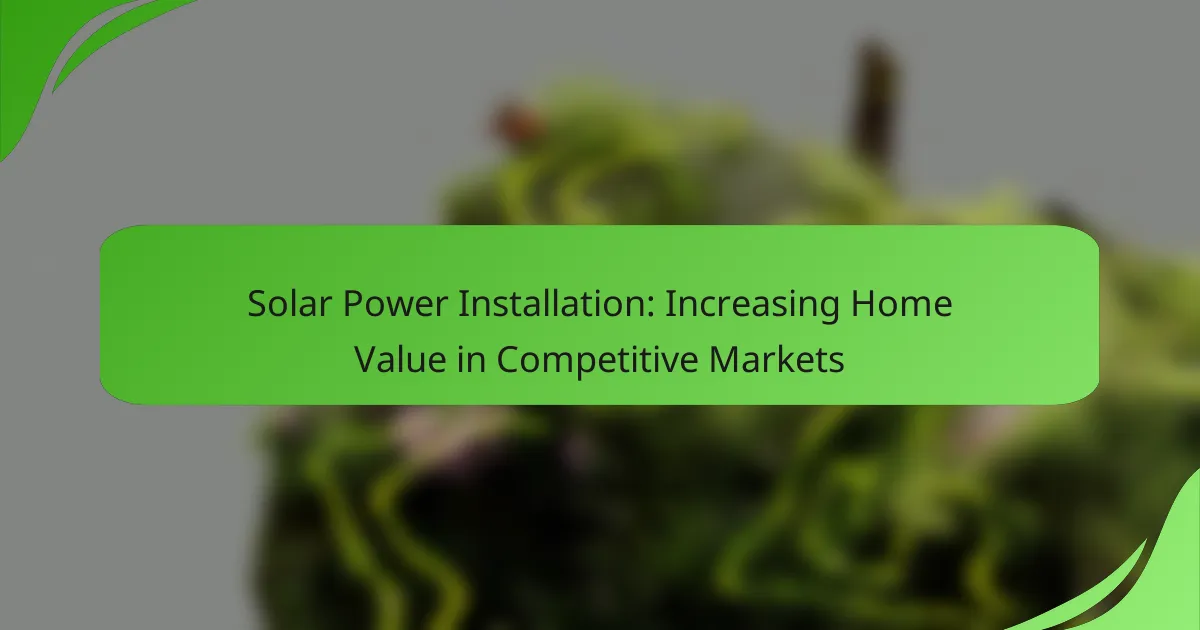Installing solar power systems can greatly increase a home’s value in competitive real estate markets by offering long-term energy savings and attracting eco-conscious buyers. Properties with solar panels tend to sell faster and at higher prices, making them a worthwhile investment for homeowners looking to enhance their property’s appeal and financial return.
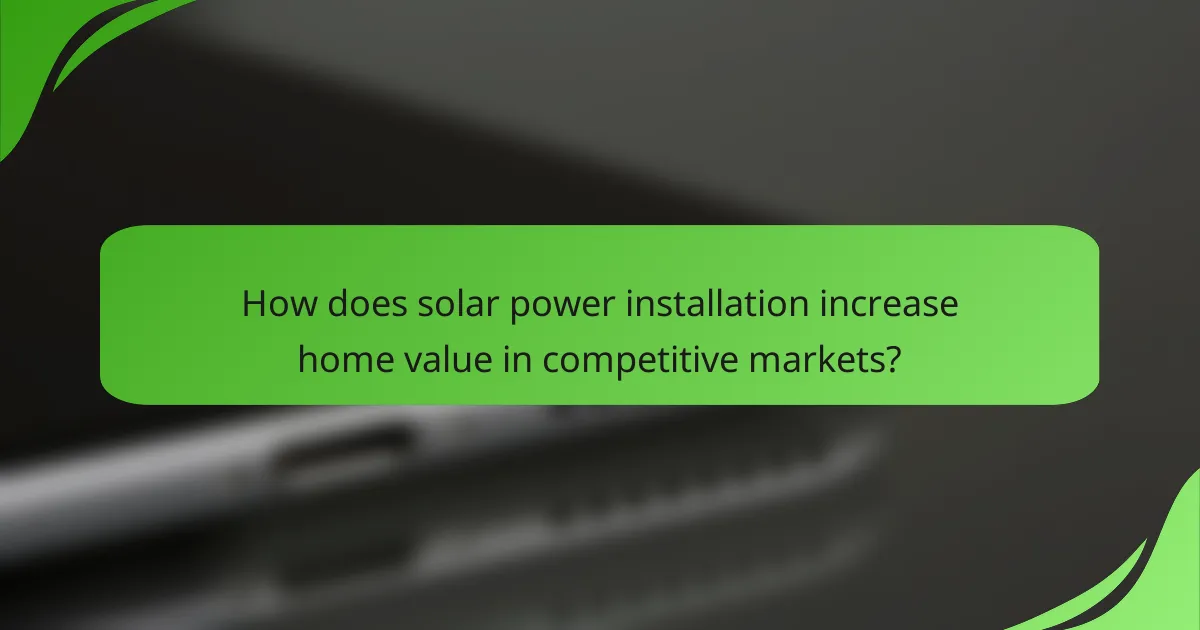
How does solar power installation increase home value in competitive markets?
Solar power installation can significantly enhance home value in competitive markets by providing long-term energy savings and appealing to a growing demographic of eco-conscious buyers. Homes equipped with solar panels often command higher prices and sell faster than those without, making them a smart investment.
Higher property appraisal values
Properties with solar power systems typically receive higher appraisals due to the added value of energy savings and reduced utility costs. Appraisers often consider the installation cost and the expected energy production when determining a home’s value. In many cases, homes with solar panels can see an increase in value ranging from 3% to 4% compared to similar homes without solar.
For homeowners looking to sell, it’s beneficial to have documentation of energy savings and system performance, as this information can positively influence appraisals. Engaging with a real estate agent knowledgeable about solar energy can also help maximize the appraisal process.
Attractiveness to eco-conscious buyers
Solar power installations make homes more attractive to eco-conscious buyers who prioritize sustainability and energy efficiency. These buyers are often willing to pay a premium for homes that align with their values, which can lead to quicker sales and higher offers. In competitive markets, having solar panels can differentiate a property from others on the market.
Marketing the environmental benefits of solar energy, such as reduced carbon footprints and energy independence, can further enhance a home’s appeal. Highlighting any local incentives or rebates for solar installations can also attract buyers interested in maximizing their investment.
Reduction in energy costs
One of the most compelling benefits of solar power installation is the significant reduction in energy costs. Homeowners can save hundreds to thousands of dollars annually on electricity bills, depending on their energy usage and local utility rates. This financial benefit not only improves the home’s affordability but also adds to its overall value.
When considering solar installation, homeowners should evaluate their current energy consumption and local solar incentives. In areas with high electricity rates, the return on investment for solar can be particularly strong, making it a wise choice for increasing home value.
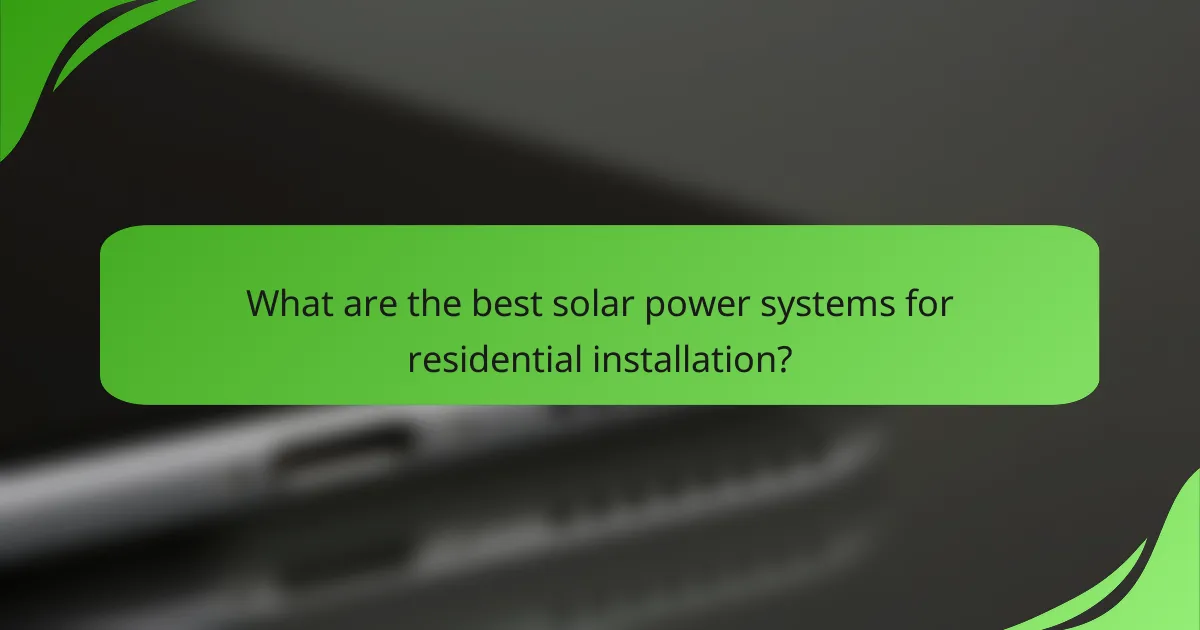
What are the best solar power systems for residential installation?
The best solar power systems for residential installation typically include high-efficiency panels from reputable manufacturers. Key factors to consider are energy output, warranty, and cost-effectiveness, which can significantly impact your home’s value and energy savings.
SunPower solar panels
SunPower solar panels are known for their high efficiency and durability, often exceeding 22% efficiency ratings. They come with a 25-year warranty, ensuring long-term performance and reliability.
These panels are ideal for homeowners with limited roof space, as their superior efficiency allows for more energy generation in a smaller area. However, they tend to be on the pricier side, which may require a larger upfront investment.
LG Solar panels
LG Solar panels offer a balance of efficiency and affordability, with models achieving around 20% efficiency. They are well-regarded for their aesthetic design and robust performance in various weather conditions.
LG panels typically come with a 25-year warranty, providing peace of mind for homeowners. Their competitive pricing makes them a popular choice for those looking to enhance home value without breaking the bank.
Canadian Solar panels
Canadian Solar panels are recognized for their cost-effectiveness and solid performance, generally achieving efficiencies between 15% and 20%. They are a good option for budget-conscious homeowners seeking reliable solar solutions.
While they may not offer the highest efficiency ratings, their lower price point and decent warranty terms make them an attractive choice for many. Homeowners should consider their energy needs and budget when selecting Canadian Solar products.
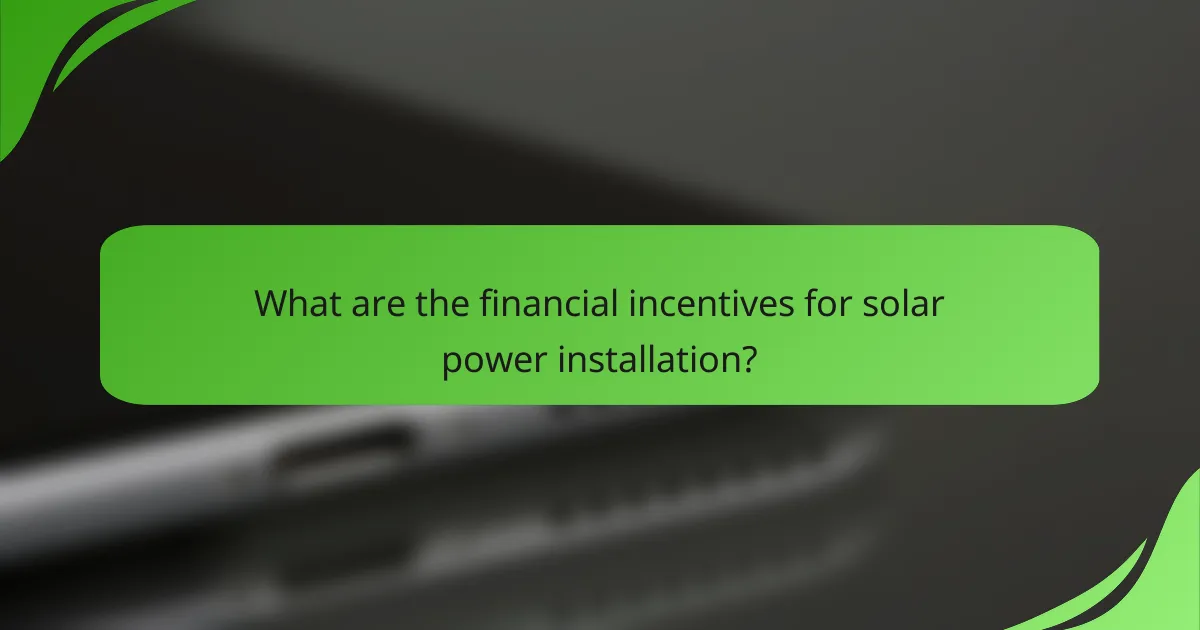
What are the financial incentives for solar power installation?
Financial incentives for solar power installation can significantly reduce upfront costs and enhance the overall return on investment. These incentives often include federal tax credits, state rebates, and local utility programs that encourage homeowners to adopt solar energy systems.
Federal tax credits
The federal government offers a tax credit for solar power installations, allowing homeowners to deduct a percentage of the installation costs from their federal taxes. As of 2023, this credit is set at 30% of the total system cost, which can lead to substantial savings for homeowners.
To qualify, the solar system must be installed on your primary or secondary residence and meet specific performance standards. It’s advisable to consult a tax professional to understand how this credit can impact your tax situation.
State rebates
Many states provide rebates for solar power installations, which can further reduce the initial investment. These rebates vary widely by state, with some offering thousands of dollars back to homeowners who install solar systems.
To take advantage of state rebates, check your state’s energy office or public utility commission website for specific programs and eligibility requirements. Be mindful of application deadlines and required documentation to ensure you receive the rebate.
Local utility incentives
Local utility companies often have incentive programs that encourage solar adoption, including cash rebates, performance-based incentives, or net metering options. These programs can help offset installation costs and provide ongoing savings through reduced electricity bills.
Investigate your local utility’s offerings, as they can differ significantly. Contact your utility provider to learn about available incentives and how to apply for them, ensuring you maximize your financial benefits from solar installation.

How to choose a solar power installer in competitive markets?
Choosing a solar power installer in competitive markets requires careful consideration of their qualifications, reputation, and the services they offer. Focus on certified professionals with positive customer feedback and robust warranties to ensure a successful installation.
Check certifications and licenses
Verify that the solar power installer holds the necessary certifications and licenses required in your area. In the United States, look for certifications from organizations like the North American Board of Certified Energy Practitioners (NABCEP), which indicates a high level of expertise.
Additionally, ensure that the installer is licensed to operate in your state, as this can affect the legality and quality of the installation. Some states may have specific requirements for solar installers, so check local regulations.
Evaluate customer reviews
Customer reviews provide valuable insights into the installer’s reliability and service quality. Look for reviews on trusted platforms such as Google, Yelp, or the Better Business Bureau to gauge overall customer satisfaction.
Pay attention to recurring themes in the reviews, such as punctuality, professionalism, and post-installation support. A pattern of positive feedback can indicate a trustworthy installer, while consistent complaints may be a red flag.
Compare installation warranties
Installation warranties can vary significantly between solar power installers, so it’s essential to compare them carefully. A good warranty typically covers workmanship for at least 5 to 10 years, ensuring that any issues arising from the installation will be addressed without additional costs.
In addition to workmanship warranties, consider the product warranties for the solar panels themselves, which usually last 25 years. This combination of warranties can provide peace of mind and protect your investment in solar energy.
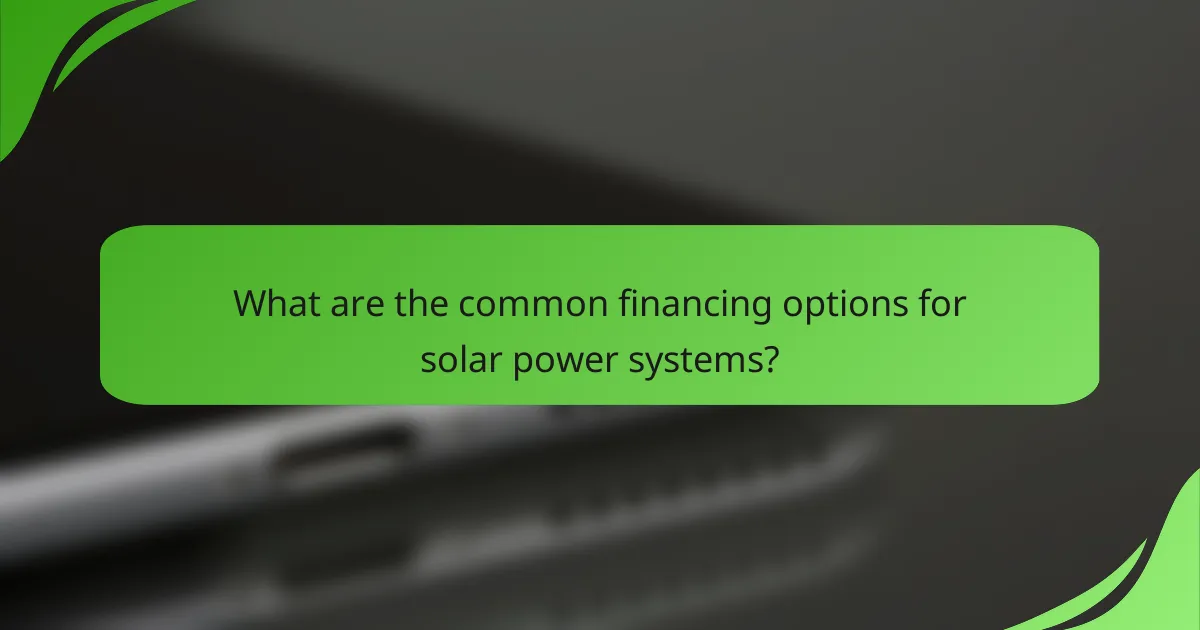
What are the common financing options for solar power systems?
Common financing options for solar power systems include solar loans, leases, and power purchase agreements (PPAs). Each option has distinct benefits and considerations that can impact your overall investment and savings.
Solar loans
Solar loans allow homeowners to finance the purchase of solar panels, typically through a bank or a specialized lender. Borrowers usually pay monthly installments over a set term, often ranging from five to twenty years, and can benefit from tax credits and incentives that reduce the overall cost.
When considering a solar loan, evaluate the interest rates, loan terms, and any fees associated with the loan. It’s advisable to compare multiple lenders to find the best deal that aligns with your financial situation and goals.
Leases and power purchase agreements
Leases and power purchase agreements (PPAs) provide alternatives to outright purchasing solar systems. With a lease, homeowners pay a fixed monthly fee to use the solar system, while a PPA involves paying for the electricity generated at a predetermined rate, often lower than local utility rates.
These options typically require little to no upfront cost, making them accessible for many homeowners. However, it’s essential to understand the terms, including the length of the agreement and any potential escalations in costs over time, as well as how these arrangements may affect your property value and eligibility for tax incentives.
